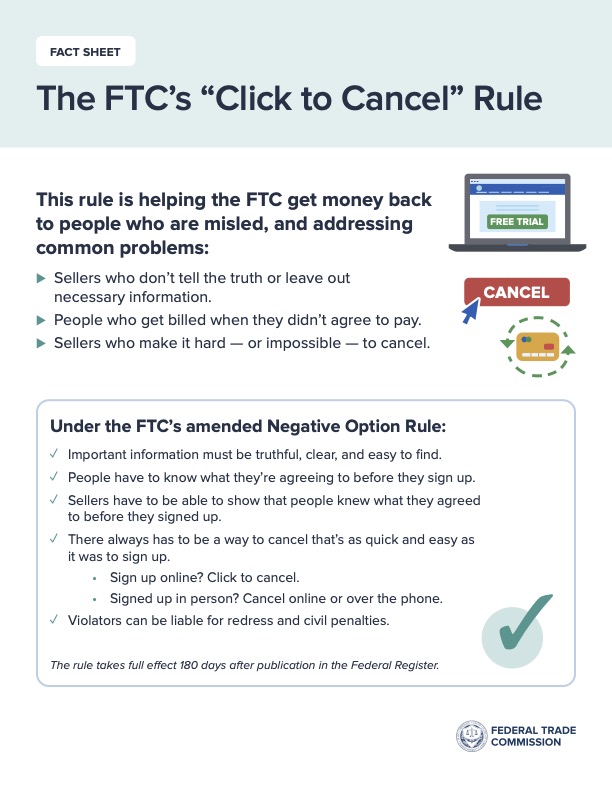FEDERAL TRADE COMMISSION FINALIZES “CLICK/CALL TO CANCEL” RULE THAT LARGELY MIRRORS NEW LAW CONSUMER FEDERATION OF CALIFORNIA SUCCESSFULLY PUSHED IN CALIFORNIA
CFC-sponsored California bill recently signed by California Governor similar to new national rule, gives consumers additional protection if FTC rule is legally challenged by business groups deceiving consumers
For Immediate Release: October 16, 2024
SACRAMENTO, CA – The Consumer Federation of California (CFC) reacted positively to the finalization of a federal rule voted on by the Federal Trade Commission (FTC) that will allow consumers to easily ‘click or call to cancel’ their automatic subscriptions.
“We are thrilled that the FTC has finalized a strong national rule that gives consumers more control over their subscriptions. Consumers have had it with budget-busting subscriptions that too many companies make almost impossible to cancel. It should be as easy to get out of a subscription as it was to get into one. That simple common-sense rule is not only the law of the land in California, but now across the nation. CFC was proud to work on this rule both at the California and national level. Kudos to the FTC and especially Chairwoman Khan for constantly standing up for consumers.”
The rule was supported by the 5-member FTC on a 3-2 vote, with FTC Chair Lina Khan and 2 other FTC Commissioners supporting it and 2 Republican Commissioners opposing it.

Last month Governor Newson signed CFC-sponsored Assembly Bill 2863 by Assemblymember Pilar Schiavo (D-Chatsworth). That bill passed the Legislature by broad bipartisan support after being opposed much of the year by numerous big business groups. California’s law appears to be a bit stronger than the FTC finalized rule, which is allowed as the federal rule permits states to do even more to protect consumers, though a final analysis is not yet available on the final federal rule.
When the California law was signed Assemblymember Schiavo stated “Unwanted subscription renewals can really add up. AB 2863 is the most comprehensive “Click to Cancel” legislation in the nation, ensuring Californians can cancel unwanted automatic subscription renewals just as easily as they signed up – with just a click or two.”
Consumers are increasingly frustrated with the complex processes necessary to cancel their unwanted subscriptions. A New York Times article spotlighted problematic renewal practices by some streaming services, which fail to remind consumers of upcoming renewals. Such tactics burden consumers financially while putting consumers into a Kafkaesque maze they feel they can never escape from to complete a simple task.
In discussing the rule, FTC Chair Lina Khan told CBS News correspondent Lesley Stahl during an interview broadcast on 60 Minutes last month that “often companies will make it easy to sign up but then when you try to cancel you have to go in person, you have to phone up but there’s nobody there to pick up the call or if there is they endlessly transfer you to somebody else if you get a real person…or you have to navigate to 17 different screens and squint to see if you can even see the fine print…” Khan added that such corporate tactics such as these and junk fees on consumers “don’t make the market more fair and honest.”
Recent issues underscored the need for stronger law in this area. In 2023 the FTC took action against Amazon for enrolling consumers in Amazon Prime without their consent and then deliberately making it difficult for them to cancel. Earlier this year the FTC sued Adobe for alleged deceptive practices such as hidden termination fees and unnecessarily complex cancellation processes. For example, consumers who believed they had canceled their subscriptions discovered that Adobe continued to charge them.
The California ‘click/call to cancel’ law will take effect on July 1, 2025, while the finalized federal FTC rule will take effect 180 days after it is published in the Federal Register, which is likely to mean April or May 2025. However, based on recent history the federal finalized rule is likely to be legally challenged by some multinational corporations that like the status quo of deceiving consumers when they want to cancel a subscription they no longer want. The federal rule is also subject to the Congressional Review Act, where Congress and the President could undo the rule early in 2025, underscoring the stakes of the upcoming election and voting for pro-consumer candidates. These are additional reasons why the CFC-sponsored California law is so important, as it provides California consumers with additional protections no matter what happens with the federal rule.
###